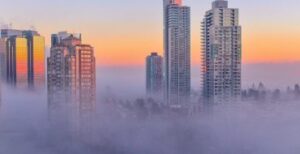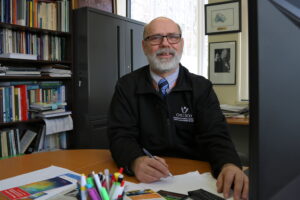
Mexico is a country on Minister Jason Kenney ’s controversial safe list. Mexican refugee claimant Veronica Castro had been murdered after returning to her native country in November 2011. Prior to leaving Canada, Castro had a premonition about dying in Mexico.
Africans and other nationals from the developing world are often blocked or deported from wealthy states. Harsh visa requirements in the West can sometimes transcend traditional ideologies; meaning countries with left and right wing governments are at fault for practising harsh immigration policies.
In 1984, I travelled on a bus from Morocco, through Spain, and into France. One of the passengers, a young Moroccan with a French girlfriend was refused entry into President Mitterrand’s Socialist France. Despite his girlfriend’s pleas, the young man had to jump on the next coach to Tangiers.
I don’t believe Jason Kenney is a racist, but his views on immigration are, in my opinion, exclusionary. Alarmingly, Kenney enjoys a fan base in the country’s mainstream media. In June,
Kelly McParland of the
National Post praised Kenney for reversing our “ridiculously lenient refugee laws”.
Mr. Kenney’s new rules have made it impossible for poor immigrants from the developing world to enter Fortress Canada. The minister has reduced access to the appeals system. He’s also blocked appeals by those who’ve been sentenced in overseas prisons. I wonder here if the imbalanced legal standards in other countries are taken into account.
Kenney has also strengthened human smuggling laws. This law might seem good on paper, but this ruling could exclude legitimate refugees. The Minister’s also slashed intern health services for refugees, which is astonishing, and has abolished a backlog of 280,000 hopeful immigrants.
In general, Canadian Conservatives are more opposed to higher immigration levels from the developing world than other Canadians. The
book Immigration Policy and the Terrorist Threat in Canada and the United States is a Conservative-influenced publication with a clear objective to tighten our country’s immigration policies.
In the light of the Post 9/11 hysteria, the writers of this report believe our ‘liberal’ immigration laws need reconsideration. The varied authors argue for reducing our intake of immigrants, because our country has become a terrorist haven. Canada’s apparent porous borders have allowed various extremists to use Canada as a launching pad to attack the United States and other western nations. According to contributor Daniel Stoffman, Ahmed Ressam is a glaring example of an undesirable who used Canada as a terrorist base – Ressam is the Algerian refugee who conspired to bomb Los Angeles and a Jewish neighbourhood in Montreal in 1999.
In Salim Mansur’s essay contribution about the Post 9/11 world the writer attacks Canada’s multicultural policies by evoking the despicable, racial ideas of
Enoch Powell – an extremist, right wing member of the British Parliament. In 1968, the former Greek classics professor gave his famous anti-immigration
Rivers of Blood speech in the House. Powell argued against letting too many immigrants into the United Kingdom. A sudden influx of immigrants – most of them originating from the Caribbean Commonwealth – would throw the nation into chaos.
Without examining the complexities and issues of the actual men involved, the July 2005 terrorist attack in London is simplistically described by Mansur as an attack “perpetrated by Muslim extremists who were born in England”. Thus, this horrific event is reduced to being a justification for closing Canada’s borders to Muslims from the developing world.
The writers in
Immigration Policy and the Terrorist Threat are concerned about the newcomers who create closed immigrant communities and fail to integrate with Anglo-French Canadian society. The writers believe such immigrants will support radical extremism in their host country. Muslim extremist groups are the primary focus in this book, but Sikh terrorists, and Sri Lanka’s Tamil Tigers are also mentioned.
I accept Canada’s current immigration laws need to be overhauled, however the ideas posed
in Lorne Foster’s Turnstile Immigration wins my vote, because his beliefs are representational of our nation’s inclusive values.
Foster – a former immigration officer – thinks our red-tape-friendly immigration system is too difficult to wade through. The system has become too complex, imbalanced, and as a result encourages many immigrants to exist in Canada through illegal means. Foster also criticizes our point system. Instead of importing people with certain skills, he believes Canada should encourage immigrants to develop their abilities after immigration, and this would augment our “human resource potential”.
Immigrants in Foster’s view should be viewed as “long-term assets in a forward-looking nation” rather than as potential terrorist threats.
Foster’s healthier, positive view of multiculturalism is more in-sync with our country’s modern values.
“The (sic) orphans of empire have chosen to live together in a loose shopping mall-like confederation – in the sense that Canada is now a panoply of diverse peoples and languages”.
However, this multicultural country has many racial issues to contend with, so newcomers from in the developing hemisphere will continue to find Fortress Canada difficult to slip into.
Racial inequality remains an unfortunate component of the Canadian system. Foster quotes a study of approximately 1,200 non-profit groups in Canada. The study revealed none of the board’s directors were people of colour. Another study proved Black Canadians earn 16 per cent less than their counterparts of European origin.
Take your own personal study. Walk down East Hastings and you’ll see a disproportionate amount of Hispanics, Blacks, Asians, Metis, and First Nations overrepresented on the city’s rougher streets.
Canadian multiculturalism should be embraced rather than feared. With the exception of our First Nations, our wonderful country is a multinational patchwork of immigrants.
 Mexico is a country on Minister Jason Kenney ’s controversial safe list. Mexican refugee claimant Veronica Castro had been murdered after returning to her native country in November 2011. Prior to leaving Canada, Castro had a premonition about dying in Mexico.
Africans and other nationals from the developing world are often blocked or deported from wealthy states. Harsh visa requirements in the West can sometimes transcend traditional ideologies; meaning countries with left and right wing governments are at fault for practising harsh immigration policies.
In 1984, I travelled on a bus from Morocco, through Spain, and into France. One of the passengers, a young Moroccan with a French girlfriend was refused entry into President Mitterrand’s Socialist France. Despite his girlfriend’s pleas, the young man had to jump on the next coach to Tangiers.
I don’t believe Jason Kenney is a racist, but his views on immigration are, in my opinion, exclusionary. Alarmingly, Kenney enjoys a fan base in the country’s mainstream media. In June, Kelly McParland of the National Post praised Kenney for reversing our “ridiculously lenient refugee laws”.
Mr. Kenney’s new rules have made it impossible for poor immigrants from the developing world to enter Fortress Canada. The minister has reduced access to the appeals system. He’s also blocked appeals by those who’ve been sentenced in overseas prisons. I wonder here if the imbalanced legal standards in other countries are taken into account.
Kenney has also strengthened human smuggling laws. This law might seem good on paper, but this ruling could exclude legitimate refugees. The Minister’s also slashed intern health services for refugees, which is astonishing, and has abolished a backlog of 280,000 hopeful immigrants.
In general, Canadian Conservatives are more opposed to higher immigration levels from the developing world than other Canadians. The book Immigration Policy and the Terrorist Threat in Canada and the United States is a Conservative-influenced publication with a clear objective to tighten our country’s immigration policies.
In the light of the Post 9/11 hysteria, the writers of this report believe our ‘liberal’ immigration laws need reconsideration. The varied authors argue for reducing our intake of immigrants, because our country has become a terrorist haven. Canada’s apparent porous borders have allowed various extremists to use Canada as a launching pad to attack the United States and other western nations. According to contributor Daniel Stoffman, Ahmed Ressam is a glaring example of an undesirable who used Canada as a terrorist base – Ressam is the Algerian refugee who conspired to bomb Los Angeles and a Jewish neighbourhood in Montreal in 1999.
In Salim Mansur’s essay contribution about the Post 9/11 world the writer attacks Canada’s multicultural policies by evoking the despicable, racial ideas of Enoch Powell – an extremist, right wing member of the British Parliament. In 1968, the former Greek classics professor gave his famous anti-immigration Rivers of Blood speech in the House. Powell argued against letting too many immigrants into the United Kingdom. A sudden influx of immigrants – most of them originating from the Caribbean Commonwealth – would throw the nation into chaos.
Without examining the complexities and issues of the actual men involved, the July 2005 terrorist attack in London is simplistically described by Mansur as an attack “perpetrated by Muslim extremists who were born in England”. Thus, this horrific event is reduced to being a justification for closing Canada’s borders to Muslims from the developing world.
The writers in Immigration Policy and the Terrorist Threat are concerned about the newcomers who create closed immigrant communities and fail to integrate with Anglo-French Canadian society. The writers believe such immigrants will support radical extremism in their host country. Muslim extremist groups are the primary focus in this book, but Sikh terrorists, and Sri Lanka’s Tamil Tigers are also mentioned.
I accept Canada’s current immigration laws need to be overhauled, however the ideas posed in Lorne Foster’s Turnstile Immigration wins my vote, because his beliefs are representational of our nation’s inclusive values.
Foster – a former immigration officer – thinks our red-tape-friendly immigration system is too difficult to wade through. The system has become too complex, imbalanced, and as a result encourages many immigrants to exist in Canada through illegal means. Foster also criticizes our point system. Instead of importing people with certain skills, he believes Canada should encourage immigrants to develop their abilities after immigration, and this would augment our “human resource potential”.
Immigrants in Foster’s view should be viewed as “long-term assets in a forward-looking nation” rather than as potential terrorist threats.
Foster’s healthier, positive view of multiculturalism is more in-sync with our country’s modern values.
“The (sic) orphans of empire have chosen to live together in a loose shopping mall-like confederation – in the sense that Canada is now a panoply of diverse peoples and languages”.
However, this multicultural country has many racial issues to contend with, so newcomers from in the developing hemisphere will continue to find Fortress Canada difficult to slip into.
Racial inequality remains an unfortunate component of the Canadian system. Foster quotes a study of approximately 1,200 non-profit groups in Canada. The study revealed none of the board’s directors were people of colour. Another study proved Black Canadians earn 16 per cent less than their counterparts of European origin.
Take your own personal study. Walk down East Hastings and you’ll see a disproportionate amount of Hispanics, Blacks, Asians, Metis, and First Nations overrepresented on the city’s rougher streets.
Canadian multiculturalism should be embraced rather than feared. With the exception of our First Nations, our wonderful country is a multinational patchwork of immigrants.
Mexico is a country on Minister Jason Kenney ’s controversial safe list. Mexican refugee claimant Veronica Castro had been murdered after returning to her native country in November 2011. Prior to leaving Canada, Castro had a premonition about dying in Mexico.
Africans and other nationals from the developing world are often blocked or deported from wealthy states. Harsh visa requirements in the West can sometimes transcend traditional ideologies; meaning countries with left and right wing governments are at fault for practising harsh immigration policies.
In 1984, I travelled on a bus from Morocco, through Spain, and into France. One of the passengers, a young Moroccan with a French girlfriend was refused entry into President Mitterrand’s Socialist France. Despite his girlfriend’s pleas, the young man had to jump on the next coach to Tangiers.
I don’t believe Jason Kenney is a racist, but his views on immigration are, in my opinion, exclusionary. Alarmingly, Kenney enjoys a fan base in the country’s mainstream media. In June, Kelly McParland of the National Post praised Kenney for reversing our “ridiculously lenient refugee laws”.
Mr. Kenney’s new rules have made it impossible for poor immigrants from the developing world to enter Fortress Canada. The minister has reduced access to the appeals system. He’s also blocked appeals by those who’ve been sentenced in overseas prisons. I wonder here if the imbalanced legal standards in other countries are taken into account.
Kenney has also strengthened human smuggling laws. This law might seem good on paper, but this ruling could exclude legitimate refugees. The Minister’s also slashed intern health services for refugees, which is astonishing, and has abolished a backlog of 280,000 hopeful immigrants.
In general, Canadian Conservatives are more opposed to higher immigration levels from the developing world than other Canadians. The book Immigration Policy and the Terrorist Threat in Canada and the United States is a Conservative-influenced publication with a clear objective to tighten our country’s immigration policies.
In the light of the Post 9/11 hysteria, the writers of this report believe our ‘liberal’ immigration laws need reconsideration. The varied authors argue for reducing our intake of immigrants, because our country has become a terrorist haven. Canada’s apparent porous borders have allowed various extremists to use Canada as a launching pad to attack the United States and other western nations. According to contributor Daniel Stoffman, Ahmed Ressam is a glaring example of an undesirable who used Canada as a terrorist base – Ressam is the Algerian refugee who conspired to bomb Los Angeles and a Jewish neighbourhood in Montreal in 1999.
In Salim Mansur’s essay contribution about the Post 9/11 world the writer attacks Canada’s multicultural policies by evoking the despicable, racial ideas of Enoch Powell – an extremist, right wing member of the British Parliament. In 1968, the former Greek classics professor gave his famous anti-immigration Rivers of Blood speech in the House. Powell argued against letting too many immigrants into the United Kingdom. A sudden influx of immigrants – most of them originating from the Caribbean Commonwealth – would throw the nation into chaos.
Without examining the complexities and issues of the actual men involved, the July 2005 terrorist attack in London is simplistically described by Mansur as an attack “perpetrated by Muslim extremists who were born in England”. Thus, this horrific event is reduced to being a justification for closing Canada’s borders to Muslims from the developing world.
The writers in Immigration Policy and the Terrorist Threat are concerned about the newcomers who create closed immigrant communities and fail to integrate with Anglo-French Canadian society. The writers believe such immigrants will support radical extremism in their host country. Muslim extremist groups are the primary focus in this book, but Sikh terrorists, and Sri Lanka’s Tamil Tigers are also mentioned.
I accept Canada’s current immigration laws need to be overhauled, however the ideas posed in Lorne Foster’s Turnstile Immigration wins my vote, because his beliefs are representational of our nation’s inclusive values.
Foster – a former immigration officer – thinks our red-tape-friendly immigration system is too difficult to wade through. The system has become too complex, imbalanced, and as a result encourages many immigrants to exist in Canada through illegal means. Foster also criticizes our point system. Instead of importing people with certain skills, he believes Canada should encourage immigrants to develop their abilities after immigration, and this would augment our “human resource potential”.
Immigrants in Foster’s view should be viewed as “long-term assets in a forward-looking nation” rather than as potential terrorist threats.
Foster’s healthier, positive view of multiculturalism is more in-sync with our country’s modern values.
“The (sic) orphans of empire have chosen to live together in a loose shopping mall-like confederation – in the sense that Canada is now a panoply of diverse peoples and languages”.
However, this multicultural country has many racial issues to contend with, so newcomers from in the developing hemisphere will continue to find Fortress Canada difficult to slip into.
Racial inequality remains an unfortunate component of the Canadian system. Foster quotes a study of approximately 1,200 non-profit groups in Canada. The study revealed none of the board’s directors were people of colour. Another study proved Black Canadians earn 16 per cent less than their counterparts of European origin.
Take your own personal study. Walk down East Hastings and you’ll see a disproportionate amount of Hispanics, Blacks, Asians, Metis, and First Nations overrepresented on the city’s rougher streets.
Canadian multiculturalism should be embraced rather than feared. With the exception of our First Nations, our wonderful country is a multinational patchwork of immigrants. 








